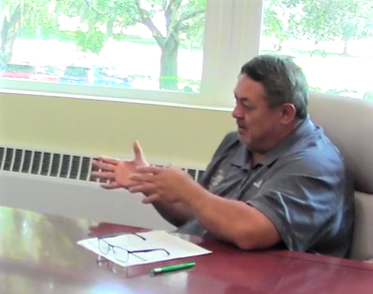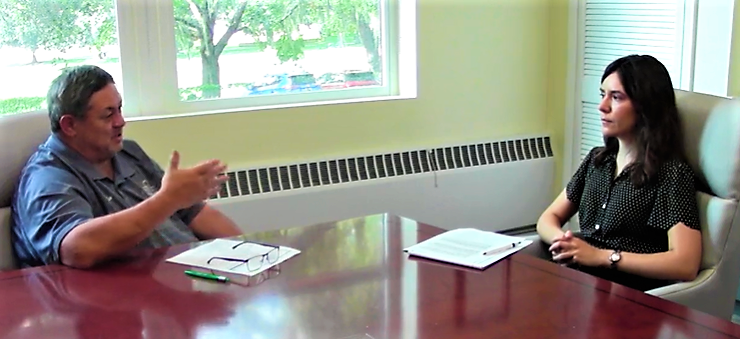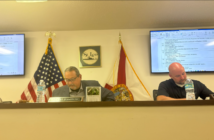By Alora Peters, Editor-in-Chief
“This is day 48,” said Dr. Edward Dadez, as he sat down with The Lions’ Pride Media Group for his inaugural interview. That was the first thing Dadez, Saint Leo University’s 11th and newest president, wanted everyone to know.
“It’s usually a little different when you talk to presidents at the end of the year,” said Dadez. “In my case, it’s less than two months being in this position.”

Dadez assumed the role of president on July 1 and has been largely focused on understanding the status of the institution whose responsibility he has inherited. However, despite the current brevity of his time in office, Dadez has already identified four main areas of concern that the university must address first: the budget deficit, recruitment, retention, and the organizational culture.
When it comes to managing the budget, the goal is to reduce the deficit with as few hardships as possible.
“When you speak to the budget deficit, we’ve been spending a lot of time…trying to figure out where cuts can be made to get the budget back to zero—zero surplus, zero deficit,” said Dadez.
Closely tied to the success of fixing the budget is the success of recruiting new students to Saint Leo.
“The key to [the budget]will be hitting our enrollment numbers for each of the six terms,” said Dadez. “If we hit those recruitment goals…then we shouldn’t have a problem in that area. We’re still very much a tuition driven institution.”
Other changes to the budget have been related to staffing and consolidations. In cases where three people may have filled three different staffing positions, for example, those three positions are being consolidated into a single role where it is possible to do so.
“We’ve had to make some tough decisions,” Dadez said, but he hopes in 18-24 months, these decisions will bear fruit and provide Saint Leo with the funding it will need to finance the operational projects people want to see on campus.
Retention is another key issue that Dadez plans to focus on. Currently, retention at Saint Leo is in the low 50 percents, which, as Dadez puts it, is “not good.”
“It means, for every 100 students we bring in, 48 of them don’t return the next year,” he said. “That’s a lot of marketing, a lot of time, a lot of energy.”
One possible reason, Dadez suspects, could be that the college experience students receive at Saint Leo is different from the college experience they were expecting.
“Are we talking about the university in a way that gets students coming here, but is not matching up with the way students think it is going to be? Whatever those reasons are, we’ve got to address them,” he said.
Dadez thinks it is important for incoming students to realize that one thing that sets Saint Leo apart from other universities is its smallness. While students are oftentimes little more than a number at larger, public universities, Saint Leo faculty and staff recognize and know the names and faces of students. For students craving anonymity, Dadez stressed that Saint Leo is “not the place to be.”
“We want people to be active both inside and outside the classrooms,” said Dadez.
Dadez also emphasized that recruitment and retention of students needs to be specifically catered depending on whether the student is attending via university campus, via the education centers, or via WorldWide online. A one-size-fits-all approach “doesn’t work.”
“A lot of [education center students]are in their 30’s, 40’s, 5o’s, wanting to work on a degree to help them in their current job or to get out of their current job,” Dadez said. “There’s a different kind of strategy you have to use to entice those students to come. How you recruit a student for university campus has to be different from how you recruit an adult student, and we have to do a better job at doing that.”
In addition to recruiting across different student communities, another key issue related to retention is attracting students to Saint Leo who are prepared for success in higher education.
“Are they able to do well here, away from home?” Dadez asked.
Some prospective students may not be ready for the rigorous schedule that college brings, and it is important for students to understand this before enrolling at Saint Leo.
“Part of that is due to [COVID-19]—a lot of students got used to taking classes online,” said Dadez. “What happens now is they are off to college, and you need to go to class.”
Dadez wanted to emphasize to students a key piece of advice that he received while in college: if students want to be able to spend time with friends and participate in the evening time recreational activities, such as intramurals and student club meetings, they need to learn to prioritize studying and homework in the morning or in between classes.
“Treat it like high school,” Dadez said, suggesting that students use an “8:00a.m.-4:00p.m.” timeframe in which to focus solely on academics, while leaving their evenings free for socialization and fun.
In addition to the budget, recruitment, and retention, the final immediate issue Dadez wishes to address is the organizational culture. Recent university surveys of faculty and staff indicated that many of them are feeling overworked and unappreciated.
“They’re not respected the way they need to be, or should be,” said Dadez. “I believe if we can turn around the organizational culture, we can turn around the retention and the recruitment.”
Having worked for more than 20 years at Saint Leo University, including as the Vice President for Student Affairs and Campus Operations and as a visiting professor in graduate education, Dadez has an ideal background and perspective for helping to resolve organizational culture issues.

Dadez is also a firm believer that it is important to view an issue from multiple perspectives in order to find solutions to problems at Saint Leo. He plans on getting input and suggestions from the people who will be most impacted by a university decision, whether that be talking with faculty and staff on ways to improve the workplace culture or working with students to improve campus life.
“Clearly, an activity I want at my age is not going to be an activity an 18- or 22-year-old wants,” said Dadez. “It’s about empowering students to help us figure out what kind of activities they want.”
The university plans to work closely with organizations like the Student Government Union and the Campus Activities Board to develop activities for the semester. Students should expect to see, though, increased amounts of activities in the new Wellness Center and in visible areas on campus such as the Bowl and Kirk Lawn, so that larger numbers of students can see and join the fun.
“We’ve got to come up with more ways to get people out of their rooms,” said Dadez, adding that he was always surprised by how few students he would see when he visited campus.
In addition to his four main goals, Dadez recognizes that there are other issues on campus that need to be addressed. In an April 2022 interview with The Lions’ Pride, former president Dr. Jeffrey Senese stated that the university planned to either remodel or replace multiple buildings on campus—such as Lewis Hall and several of the residence halls, including Apartments 1-4—that were suffering from mold and maintenance problems. Dadez confirmed that renovating these buildings is still on the university’s to-do list.
“Clearly, we need to have a new health and science building,” said Dadez, referring to Lewis Hall. Over the next twelve months, the university plans on campaigning to raise funds for the construction of a new science building to replace Lewis. The new building—which would likely be located at the current location of DeChantal Hall—is a looming necessity for Saint Leo’s incoming nursing students, but would also be able to provide new and updated labs for biology and chemistry students.
Refurbishing the residence halls on campus is another priority.
“It’s time to replace furniture, it’s time to replace carpet,” said Dadez. “If there’s extra money, it’s got to be spent on the renovations of those facilities.”
As Saint Leo prepares to welcome students in the fall, with Fall 1 classes beginning online August 29 and on university campus on August 30, members of the Saint Leo community will wait with anticipation to see how Dadez’s new leadership and policies will impact the university and what other new changes are in store for Saint Leo.






1 Comment
Top site ,.. amazaing post ! Just keep the work on !